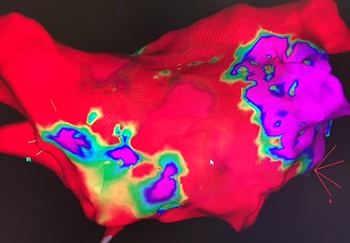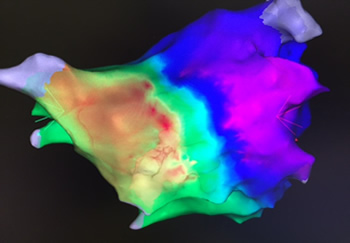
Our bodies do all kinds of weird things. How do you know when to ignore something and when to get to the doctor ASAP? We break down what’s normal and what’s not in this occasional series.
Has your heart ever skipped a beat or hammered loudly against your chest? And has this made you wonder what causes heart flutter? Worry that your racing heart means something is terribly wrong?
Several years ago, when my heart started beating so loudly I couldn’t sleep, I ran to the doctor. The EKG she gave me revealed that my heart was fine. The culprit spurring my heart to canter: stress.
But that doesn’t mean abnormal heart rhythms never indicate a problem.
I asked expert cardiologist, Andrew Darby, MD, to clarify the difference.
Normal Skips of the Heart
Heart palpitations (a generic, not medical, term) that last a second or two and happen infrequently should not cause you to worry.
It just so happens that some people have “premature beats, also called premature atrial contractions or premature ventricular contractions,” Darby explains. “For most people, having a single, extra heartbeat that feels like a brief, intense skip can be normal and benign.”
What Causes Heart Flutter (the Normal Kind)
The heart has its own electrical system. Electricity flows through your heart constantly, maintaining your heart’s rhythm. At the top of the heart lives the pacemaker, a spot that sends electrical discharges through the wires in the heart, telling it when to beat.
But any area in the electrical system or in the heart tissue itself can generate an electrical discharge. Introducing stress, anxiety, caffeine, chocolate, alcohol or other stimulants into your blood system has the ability to interfere with the electric flow at any place on your heart: This causes heart flutter.
And this is why you might have a twinge of pain along with a palpitation: The electricity charges through your heart’s muscle fibers. “People forget the electricity affects the physical part of the heart,” Darby says.
Abnormal Heart Palpitations
You should call your doctor if the following occurs. You could have an arrhythmia, or heart rhythm disorder.
When Other Symptoms Join In
If you can hear your heart and feel it racing, it’s definitely something that should be evaluated, especially if you also feel faint, lightheaded, shortness of breath and/or chest tightness.
When Palpitations Persist
Another deciding factor: How long the palpitations last. “If just a second or two, it’s less worrisome. But if the feeling is ongoing,” Darby says, “like lasting minutes, you should call the doctor. An evaluation with a primary care physician is a good place to start.” Depending upon the symptoms or initial evaluation, a referral to a cardiac electrophysiologist such as Darby may be the next step. Cardiac electrophysiologists are cardiologists who specialize in the treatment of heart rhythm disorders.
How to Tell? Take Your Own Pulse
Taking your own pulse can help you measure the steadiness of your heartbeat and whether you need to seek professional help.
Put your hands on the outside of your wrist gently. If you feel:
- A nice rhythmic pulsation — this is normal
- An erratic, inconsistent pulse, or if it’s hard to detect — this is problematic; see a doctor

What Causes Heart Flutter (the Abnormal Kind)
Heart rhythm disorders, or arrhythmias, can occur if your heart beats too fast or too slow. These include atrial fibrillation, supraventricular tachycardia and ventricular tachycardia.
Atrial fibrillation, or afib, Darby’s specialty, is the most common heart rhythm condition that causes heart flutter.
Darby describes afib as an “electrical storm in the upper chambers of the heart. Excess electricity overwhelms the system, and the atria start to contract and beat rapidly.”
The increased pace of the top part of the heart throws the whole system out of rhythm. When the “upper and lower chambers are not in sync, the heart stops pumping with maximum efficiency. This often causes fatigue and shortness of breath.”
While not life-threatening at this stage, untreated afib increases your risk of stroke.
“In fact,” Darby says, “afib causes about 15 percent of all strokes. And since some patients may not have symptoms with atrial fibrillation, the first sign of it is occasionally stroke.”
Why? Not pumping the blood through at a normal pace means that some of it just pools in the heart. This excess blood can form clots. The clots can dislodge and travel to the brain.
Preventing Arrhythmias
While afib is very common — 10 percent of us will have it by age 80 — and genetics can play a role, you can lower your risk by managing conditions like:
- High blood pressure
- Diabetes
- Sleep apnea
And if you get diagnosed with afib, treatments exist to get your heart’s rhythm back on track.
Turn the Beat Around
Learn more about arrhythmia treatments we offer at UVA.
Restoring Rhythm
The anatomy of every heart is different, and every rhythm is different, too. Which is why, Darby says, determining the right treatment first requires “deciphering the patient’s individual rhythm.”
Treatments range from medication to ablation, a minimally invasive procedure that involves cauterizing the problematic electrical spot in the heart.
“Basically, with ablation, we eliminate the abnormal electrical focus to restore the normal rhythm of the heart,” Darby explains. Cardiac electrophysiologists such as Darby use an advanced computer system and special ultrasound catheters during the procedure to create a model of the whole heart and its electrical system. This real-time image shows where the electricity flows and gets disrupted. They can then watch how their treatment eliminates the abnormal electricity and restores the system to its normal flow and pace.
For Darby, “if ablation is an option, the results can be very gratifying, especially when it works for patients who have had frequent or daily episodes.”


I have been having pounding in my left side every night for quite sometime. My doctor gave me Bactoflan to help with muscles spasms and sleep. No help and I started having tightness in chest numbness on the top of my head and chin. Stopped the medication but still dont feel right. My doctor mentioned temporal arteritis but no followup. I’m only 52 yrs young….
i started feeling the fluttering right below my left breast. Sometimes it lasts a second or two sometimes longer maybe 5 seconds. The other day the fluttering was more frequent in occurrences, like it will last longer and in rapid succession then it stops. I went to see my primary doctor who is an Internist. They ordered an EKG test and the result was normal. Now my doctor was not as concerned as I am. I am worried that something emergency medical might occur and I don’t even want to guess it. He ordered a Stress Test done on Tuesday, 4 days after my visit with him.
Very good information. Lucky me I ran across your website by chance (stumbleupon). I have bookmarked it for later!